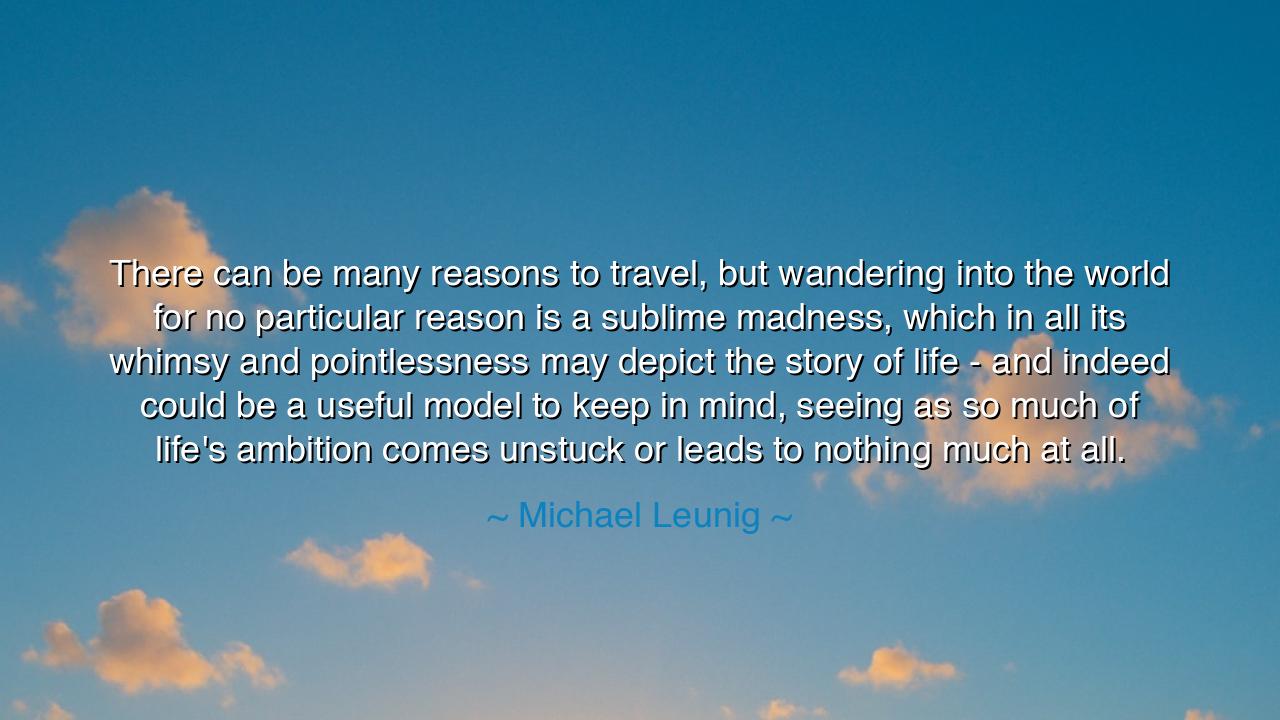
There can be many reasons to travel, but wandering into the
There can be many reasons to travel, but wandering into the world for no particular reason is a sublime madness, which in all its whimsy and pointlessness may depict the story of life - and indeed could be a useful model to keep in mind, seeing as so much of life's ambition comes unstuck or leads to nothing much at all.






Hear the words of Michael Leunig, who proclaimed: “There can be many reasons to travel, but wandering into the world for no particular reason is a sublime madness, which in all its whimsy and pointlessness may depict the story of life—and indeed could be a useful model to keep in mind, seeing as so much of life’s ambition comes unstuck or leads to nothing much at all.” At first, these words seem playful, the musings of a poet upon idleness. Yet within them lies a radiant wisdom: that not all journeys must be driven by purpose, and that sometimes the truest lessons come when one surrenders to the wandering itself.
The heart of the saying is this: travel need not always be chained to goals, achievements, or destinations. To walk without aim, to drift into the unknown for no reason other than to wander, is a kind of holy folly—a sublime madness. It mirrors the mystery of life itself, for do we not enter this world without choice or plan, wandering through its days with no clear destination until the end? Thus, purposeless wandering may not be meaningless at all—it may instead be the most honest reflection of existence.
The whimsy and pointlessness Leunig praises are not to be confused with waste. They are a protest against the tyranny of relentless ambition, which promises glory but so often delivers disillusionment. How many men have built empires only to see them crumble? How many have chased wealth, power, or fame, only to find emptiness at the summit? In contrast, the wanderer who steps out for no reason at all discovers joy in the small things, in the unexpected turns, in the simple act of being.
History offers us many such wanderers. Consider Diogenes of Sinope, the philosopher who rejected wealth and ambition, living in a barrel and mocking the grand designs of kings. Though many thought him mad, his wandering life revealed truths about simplicity and freedom that scholars still ponder centuries later. Or recall the poet Basho, who wandered Japan not in search of riches, but to write haiku about frogs, rivers, and the fleeting beauty of the seasons. In their sublime madness, they touched eternity more deeply than many who plotted their lives with rigid ambition.
There is also a quiet strength in this surrender. For when one wanders, free of plan, one cannot be defeated by failure. If there is no goal, there can be no collapse. Every step, every encounter, every scene along the road becomes enough in itself. Thus Leunig teaches us that to live like a wanderer is to free oneself from the chains of outcomes, and to embrace the present moment as a gift beyond measure.
The meaning, then, is not that ambition is evil, but that it is fragile. It may “come unstuck” or lead to “nothing much at all.” By contrast, the pointless wandering of life—its conversations, friendships, sunsets, and laughter—these endure, for they ask for nothing and yet give everything. The wanderer’s road is a reminder to seek beauty not in achievements, but in the act of living itself.
The lesson for us is clear: do not fear stepping into the world without a plan. Allow yourself to wander, to embrace moments of whimsy and apparent pointlessness, for they may reveal truths that grand ambitions conceal. Practically, this means loosening the grip of rigid goals, leaving space in your days for unplanned adventures, for simple walks, for journeys taken with no destination in mind. In such moments, you may find the wisdom of life itself.
Therefore, children of tomorrow, remember the counsel of Michael Leunig: life is not always a march to victory, but often a wandering to nowhere, rich in beauty, mystery, and surprise. Embrace the sublime madness of wandering, for in it you will learn to love the road itself, and not just the imagined prize at its end. For in the end, life itself is a journey with no reason given—so let your steps be light, your heart open, and your joy in the wandering itself.






AAdministratorAdministrator
Welcome, honored guests. Please leave a comment, we will respond soon